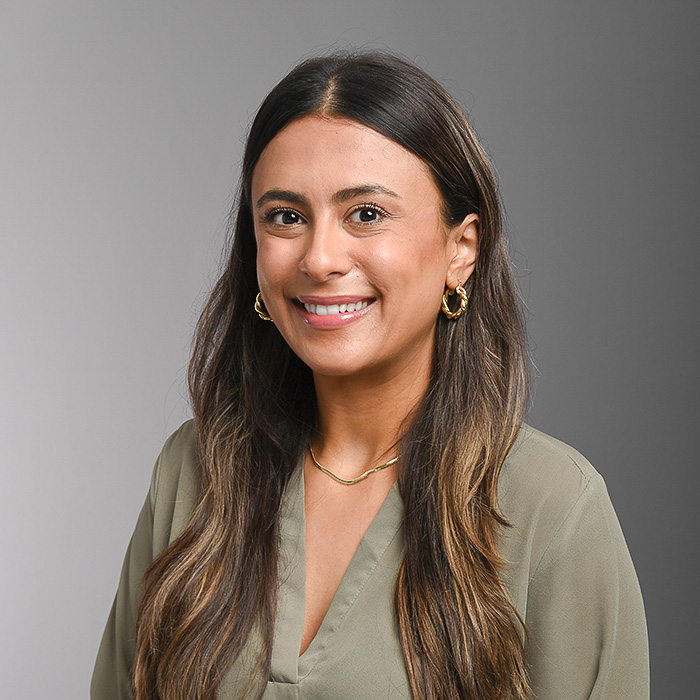Education
Ph.D., Special Education, George Mason University, 2024
M.Ed., Education and Assistive Technology, George Mason University, 2018
B.A., Speech Language Pathology and Linguistics, Wayne State University, 2014
Areas of Expertise
Universal design for learning
Assistive technology
Technology-based interventions
Autism
Learning disabilities
Computer science/STEM instruction for students with disabilities
Accessibility
Immigrant and disability identity intersections
Biography
Roba Hrisseh, Ph.D., is an Assistant Professor of Special Education at Towson University.
She earned her doctorate from George Mason University as an Office of Special Education
Programs (OSEP) scholar. Before pursuing her doctoral studies, Dr. Hrisseh’s career
focused on implementation of assistive and educational technology for individuals
with disabilities across various settings, including public and charter schools, nonprofit
organizations and and postsecondary institutions.
During her doctoral program, Dr. Hrisseh taught undergraduate courses in special education,
conducted research on technology-based interventions for students with disabilities,
and completed internships at the OSEP and CAST. She is committed to the use of technology
to ensure all learners’ equitable access to education and the application of Universal
Design for Learning principles to eliminate barriers for students with disabilities.
Selected Publications
- Evmenova, A. S., Regan, K., Mergen, R., & Hrisseh, R. (2025). Educational games and
the potential of AI to transform writing across the curriculum. Education Sciences, 15(5), 567. https://doi.org/10.3390/educsci15050567
- Regan, K., Evmenova, A. S., Hutchison, A., Mergen, R., Hrisseh, R., Day, J., Hayes,
C., Gafurov, B. (2024). Implementation of a technology-based writing intervention
to support writing quality. Literacy Research and Instruction, 1–26. https://doi.org/10.1080/19388071.2024.2425844
- Evmenova, A. S., Regan, K., Mergen, R., & Hrisseh, R. (2024). Improving writing feedback
for struggling writers: Generative AI to the rescue? TechTrends, 68(6), 790–802. https://doi.org/10.1007/s11528-024-00965-y
- Evmenova, A. S., & Hrisseh, R. (2024). Assistive technology assessment approaches.
In K. K. Floyd, T. Jeffs, & K. S. Puckett (Eds.), Assistive technology and universal design for learning (1st ed., pp. 61–81). Plural Publishing.
- Evmenova, A. S., & Hrisseh, R. (2022). Use assistive and instructional technologies.
In R. Pennington, M. Ault, G. Courtade, J. M. Jameson, & A. Ruppar (Eds.), High leverage practices and students with extensive support needs (1st ed., pp. 234–245). Routledge.
Selected Presentations
- Hrisseh, R. & Evmenova, A.S., Regan, K., Mergen, R. L. (2025, March). Tech tales: Essay writing using block-based computer code. Council for Exceptional Children (CEC). Baltimore, MD.
- Hrisseh, R., Evmenova, A. S., Mergen, R. L., & Murnan, R. (2024, November). Forging ahead in inclusive education: Combining Scratch, UDL, and culturally responsive
pedagogy. Teacher Education Division (TED) of Council for Exceptional Children. Pittsburgh,
PA.
- Evmenova, A. S., Regan, K., Palmer, A., & Hrisseh, R. (2024, October). Improving the essay quality via a technology-based writing intervention package. Council for Learning Disabilities (CLD) 46th International Conference on Learning
Disabilities Charlotte, NC.
- Mergen, R. L., Lee, J. Y., & Hrisseh, R. (2024, October). Strategies for supporting diverse learners in mathematics writing interventions. Council for Learning Disabilities (CLD) 46th International Conference on Learning
Disabilities Charlotte, NC.
- Murnan, R., Evmenova, A. S., Regan, K., & Hrisseh, R. (2024, October). Seeing the unseen: An exploratory study of idea generation processes. Council for Learning Disabilities (CLD) 46th International Conference on Learning
Disabilities Charlotte, NC.
Research
Dr. Hrisseh's research interests center on assistive technology, educational technology,
accessibility, Universal Design for Learning, computer science instruction for students
with disabilities, the intersection of immigrant identity and disability and single-case
design research methodology.
